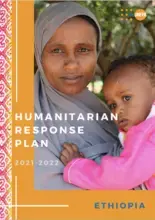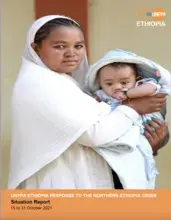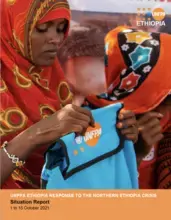A mission led by the Deputy Executive Director–Programme of UNFPA, Mr. Dereje Wordofa, paid a one-day visit to the Gambella Region of Ethiopia today as a follow-up to the strategy meeting that was held in Addis Ababa to guide the Fund’s humanitarian partnership and work in the Horn of Africa.
Briefing the President of the Gambella Region of Ethiopia, H.E. Gatluak Tut Khot, in his office, Mr. Dereje commended Ethiopia’s well-established refugee response and coordination processes and the open border policy the country is pursuing for persons fleeing persecution or armed conflict. The Deputy Executive Director appreciated the leadership the Ethiopian Government is providing in building resilience through strengthening the nexus between development and humanitarian work. He assured the President UNFPA’s continued engagement in the Region working with other partners to alleviate the massive humanitarian situation.
The President of the Gambella Region noted that one big challenge in alleviating the humanitarian situation in the Region relates to the issue of health. He noted that the huge number of refugees the Region is hosting is creating undue pressure on the scarce social services such as health creating tension and conflicts between refugees and host communities. The President underlined that the issue of maternal health and gender-based violence is especially critical asking UNFPA to step-up its support.
The Gambella Region currently hosts more than 400,000 refugees, of which 88 percent are women and children according to the latest situation update of the UNHCR. The Jewi Refugee Camp which was visited by the mission hosts a little over 60 thousand people comprising 15 percent of the refugee population in the Gambella Region.
The mission visited the Maternal and Child Health services being provided at the Health Centre – the only health centre at the Jewi Camp. An average of 40 to 50 deliveries are conducted per week at the Health Centre and pregnant women with obstetric complications get referred to the Gambella Referral Hospital. But it was disclosed that the acceptance rate of family planning services are low among the refugees, even though there is a good stock of commodities.
Visiting the Women Friendly Space (WFS) established at the camp by UNFPA and operated by the International Medical Corps, the mission was briefed that the WFS is part of the UNFPA supported project on addressing Sexual and Gender Based Violence in humanitarian settings which has both prevention and response components. The coordinator of the project said the WFS provides education, vocational training and life-skills training to survivors of sexual and gender based violence. She added that survivors are also give psycho-social counselling with cases being referred to health institutions or legal bodies for further follow-up.
Appreciating the strength of the women at the WFS, the Deputy Executive Director and the UNFPA East and Southern Africa Region Regional Director encouraged the women to continue being strong willed assuring them that UNFPA will work with other partners to continue helping alleviate their situation.
Mr. Dereje’s mission also visited the SRHR Program Centre in the Jewi Refugee Camp run by the International Medial Corps with the support of UNFPA. It was disclosed during the visit that due to increasing awareness, the demand for SRH services is growing.
Responding to resource constraint concerns raised at the WFS and the SRHR Program Centre, Mr. Dereje alluded to competing humanitarian priorities around the world which are affecting the availability of resources giving assurance that the concerns will be factored-in in UNFPA’s humanitarian planning for the Horn of Africa stressing the need to look for long-term and lasting solutions.
The maternal and neonatal health units at the Gambella Referral Hospital which are being supported by UNFPA through the provision of supplies and training of health professionals were also visited by the mission. The Deputy Executive Director assured the CEO of the hospital UNFPA’s keenness to continue providing skills training for the health professionals and ensuring uninterrupted provision of supplies.





